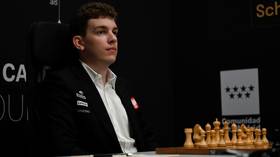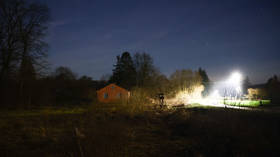Polish chess grandmaster refuses handshake with Russian opponent (VIDEO)

Polish chess grandmaster Jan-Krzysztof Duda refused to shake the hand of his Russian opponent Denis Khismatullin during last month's International Chess Federation’s World Rapid and Blitz Chess Championships, footage from the event shows. Khistamullin has not filed a formal complaint about the snub.
The high-profile tournament took place in Uzbekistan at the end of December although the incident only made headlines on Tuesday after a video of it surfaced online.
In the footage, Khismatullin extends his hand towards Duda, an obligatory ritual before the start of a match, and the Pole is seen refusing the gesture.
Their game ended in a draw. According to World Chess Federation (FIDE) rules, the handshake between opponents is a mark of mutual of respect ahead of every game. Duda could have been disqualified if Khismatullin had filed a complaint, but the Russian opted not to do so, newspaper Sport-Express newspaper reported.
🇵🇱 Polské sítě dnes žijí záznamem začátku zápasu v bleskovém šachu, během kterého polský reprezentant Jan Krzysztof Duda odmítl podat ruku svému soupeři z Ruska. Rus Denis Chrismatulin je známý svou podporou války na Ukrajině. pic.twitter.com/qYKMbOz9Ui
— Andreas Papadopulos (@andreas_ppdp) January 2, 2024
Last summer, Ukrainian competitor Olga Kharlan ended up being disqualified from the World Fencing Championships in Italy after refusing to shake hands with her Russian rival Anna Smirnova. However, following an intervention from IOC president Thomas Bach, Kharlan was allowed to take part in a team event at that same tournament and was also granted automatic qualification for this year’s Olympics in Paris.
Poland has been one of Ukraine’s main supporters in the EU amid the conflict with Russia, supplying Kiev with arms, accepting around 1.5 million Ukrainian refugees, and consistently advocating more sanctions against Moscow.
However, a falling-out between the neighbors occurred in September after Ukraine filed a now-suspended complaint to the World Trade Organization (WTO) over a ban by Poland and some other EU states on Ukrainian grain deliveries. Warsaw said it would focus on its own security and would not be sending weapons to Ukraine anymore, except some old, decommissioned ones.
Currently, Polish truckers continue to block border crossings in protest against the EU’s decision to exempt their Ukrainian counterparts from having to seek permits to enter the bloc. They argue that measures introduced by Brussels after the outbreak of the conflict between Moscow and Kiev led to unfair competition and drove down the prices of agricultural products. Talks between Kiev and Warsaw have so far been unable to resolve the deadlock.














